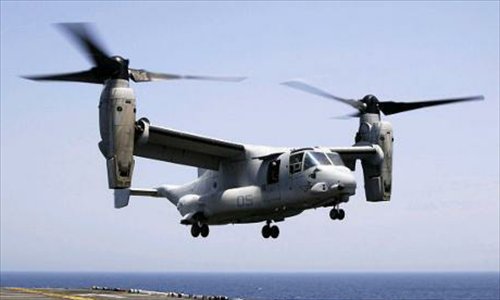China slams Japan's military deployment

Photo: military.china.com
China's foreign ministry has expressed concerns over Japan's deployment of advanced military installations two days in a row, slamming Tokyo and Washington for creating tensions and instability in the region.
The ministry's spokesperson Hong Lei Tuesday told a regular press briefing that China has taken note of reports on Japan's plan to deploy Global Hawk unmanned high-altitude reconnaissance aircraft.
The US-made drone is reportedly to be deployed within the fiscal year 2015 to beef up Japan's air surveillance capabilities to deal with territorial disputes.
According to media reports, the Japanese defense ministry also plans to build new monitoring facilities on Iwo Jima, an island 1,200 kilometers south of Tokyo, to collect information about Chinese vessels' activities in the Pacific.
"Some countries try to deliberately make excuses for a push to expand their military role by creating tensions and threats," Hong said, noting China's normal marine activities "are in line with international law and do not pose a threat to any other country."
On Monday, Hong also expressed concerns over US plans to install an X-band radar system in Kyoto, claimed to defend against North Korean missiles.
According to Japan's Kyodo News, Kyoto Governor Keiji Yamada last week endorsed the installation of the so-called X-band radar on the Japanese Air Self-Defense Force (ASDF)'s Kyogamisaki sub-base in the city of Kyotango. A similar X-band radar has already been set up on the ASDF's Shariki sub-base in northern Japan.
Hong said China believes that unilaterally deploying an anti-missile system or forging an alliance is not conducive to the resolution of the regional nonproliferation issue, or the peace and stability of the Asia-Pacific region.
An air force observer, who asked to remain anonymous, said that the deployment of X-band radar in Japan will help expand the US' scope and accuracy for surveillance and will track ballistic missiles launched from multi-directions.
The observer noted that given the number, range and quality of North Korean ballistic missiles, it is not feasible that the radar system was set up to only target the North. "The [aim of] deploying anti-missile radars in South Korea and Japan is similar to that of deploying Aegis destroyers in the West Pacific and a land-based anti-missile interceptor system in Alaska … They target China and Russia," he said.
"The deployment of a missile defense system in Japan has been advancing south, gradually installing its so-called strategic defense weapon at the door of our country," Wu Huaizhong, a research fellow with the Institute of Japanese Studies at the Chinese Academy of Social Sciences, told the Global Times.
An expert on military science, who asked not be named, said that the US' next step would be to deploy the system in the Philippines, so as to turn its anti-missile system in East Asia into a network for full coverage of the region.
"While holding the strongest spear, Washington is building the most solid shield … There is no doubt that it will push some countries to the opposite side, which would undermine the strategic balance in East Asia," he said, adding that the US is to blame for a dividing Asia-Pacific.
"Compared with China's active implementation of UN resolutions [on North Korea], the US and Japan's acts are not constructive," Wu said.
China's commerce ministry Monday published a list of technologies and goods banned from export to North Korea for their possible use in building nuclear, chemical and biological weapons.
Separately, Chinese activists Tuesday denied a report by Japan's Yomiuri Shimbun paper, which said the group would set sail for the disputed Diaoyu Islands in the East China Sea on Thursday.
Li Yiqiang, secretary-general of the World Chinese Alliance in Defense of the Diaoyu Islands, told the Global Times that the group had decided to postpone the trip due to adverse weather, and will leave for the islands after October 7.
Xinhua contributed to this story